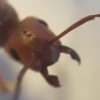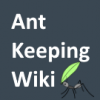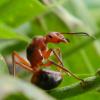Forgive me if this is a stupid question, but I can't find *any* information about this on Google or otherwise. I had a thought yesterday, instead of keeping live feeder insects, there's a huge carpenter ant colony next to my driveway. There's probably dozens of them running across the pavement at any time, and it'd be super easy to pluck some up, freeze them, and use them as food. Ignoring the ethics of feeding a colony with it's own species, would this be a suitable alternative? The main concerns would be 1- parasites or other infections transferring to my ants, but from what I read freezing them for at least 48 hours should take care of this. 2- outdoor insects in general might have pesticides on them, but considering no one near me uses pesticides, it *shouldn't* be a problem. And 3- that they would react badly to an ant from a different colony, and might attack it and/or not eat it. This is what sounds like the biggest roadblock to me.
Again, I assume that since I never hear people mention this as a possibility, there's probably a reason no one does it, but since I can't find any info on it, I'm curious to hear what people think.


















